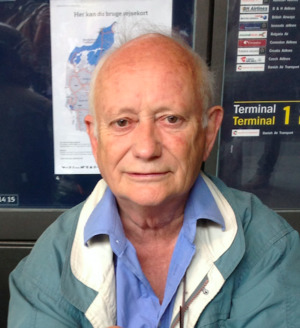Michael F. Land facts for kids
Quick facts for kids
Michael F. Land
FRS
|
|
|---|---|

Land in 2013
|
|
| Born | 12 April 1942 England
|
| Died | 14 December 2020 (aged 78) |
| Education | Birkenhead School |
| Alma mater | University of Cambridge |
| Scientific career | |
| Fields | Neurobiology |
| Institutions | Sussex Centre for Neuroscience |
| Thesis | (1968) |
Michael Francis Land (1942 – 2020) was a British scientist who studied the brain and nervous system, especially how we see. He was known as a neurobiologist. He worked as a professor at the Sussex Centre for Neuroscience, which is part of the University of Sussex in England.
Professor Land spent his career exploring how different animals and humans see the world. He was very interested in the special ways that marine animals, like scallops, shrimps, and deep-sea crustaceans, use their eyes. He also looked closely at how spiders and insects use their vision, especially when they are chasing something.
His work led him to study how eyes move, first in animals and then in people. His team focused on how eye movements help us with everyday activities. This included things like driving a car, reading music, and playing ball games.
For example, in 2000, Professor Land and a colleague discovered something amazing about cricket players. They found that top batsmen quickly look away from the ball after it leaves the bowler's hand. Instead, they look ahead to where they think the ball will bounce. This helps them predict its path. He also researched how mosquitoes process visual information using their eyes.
Michael Land passed away on December 14, 2020, when he was 78 years old.
Becoming a Scientist: Michael Land's Education
Michael Land was the son of Frank William Land. From 1950 to 1960, he went to Birkenhead School in Cheshire, England. After school, he went to the University of Cambridge. There, he studied zoology, which is the study of animals, and he graduated in 1963.
He then continued his studies at University College London (UCL). He earned his PhD in neurophysiology in 1968. Neurophysiology is the study of how the nervous system works. It was at UCL that Michael Land began his important research into how humans and animals see.
Michael Land's Career and Discoveries
After finishing his PhD, Michael Land worked as an assistant lecturer in Physiology at UCL. In 1969, he moved to the United States. He became an assistant professor of Physiology at the University of California, Berkeley.
In 1971, he returned to the UK and started working at the University of Sussex. He was a lecturer in neurobiology. He became a "reader" (a senior academic position) in 1977. In 1982, he was chosen to be a Fellow of the Royal Society. This is a very high honor for scientists in the UK. After this, he became a full professor in 1984.
Professor Land also spent time as a senior visiting fellow at the Australian National University in Canberra from 1982 to 1984. His amazing work was recognized with several awards. In 1994, he received the Frink Medal from the Zoological Society of London. In 1996, he was given the Alcon Prize for his research on vision. He retired from full-time teaching in 2005 but continued his work as an emeritus professor at Sussex.

